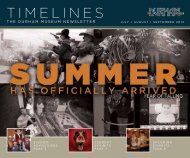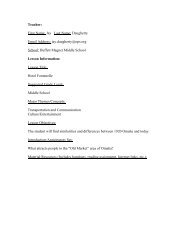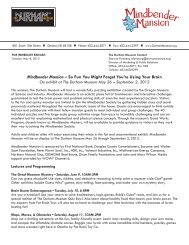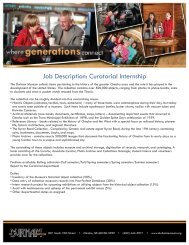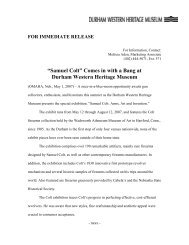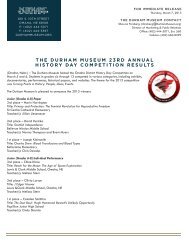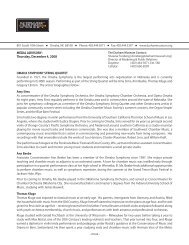LUTHER S. WILLIAMS Provost and Vice President for Academic ...
LUTHER S. WILLIAMS Provost and Vice President for Academic ...
LUTHER S. WILLIAMS Provost and Vice President for Academic ...
You also want an ePaper? Increase the reach of your titles
YUMPU automatically turns print PDFs into web optimized ePapers that Google loves.
<strong>Provost</strong> <strong>and</strong> <strong>Vice</strong> <strong>President</strong> <strong>for</strong> <strong>Academic</strong> Affairs,<br />
Dean, Graduate Studies <strong>and</strong> Research, <strong>and</strong><br />
Distinguished Professor of Biology <strong>and</strong> Director,<br />
Integrative Bioscience Ph. D. Program<br />
Tuskegee University<br />
Phone: 334/725-2336<br />
Fax: 334/725-2332<br />
Email: luther.williams@tuskegee.edu<br />
<strong>LUTHER</strong> S. <strong>WILLIAMS</strong><br />
Prior to joining Tuskegee University as the <strong>Provost</strong> <strong>and</strong> <strong>Vice</strong> <strong>President</strong> <strong>for</strong> <strong>Academic</strong> Affairs (2006-2009),<br />
Dr. Luther S. Williams served as the William T. Kemper Director of Education <strong>and</strong> Interpretation at the Missouri<br />
Botanical Garden from August, 2001- December 31, 2005. During that tenure, he designed <strong>and</strong>, in 2002<br />
launched, the program of the Garden Education Compact, a collaborative ef<strong>for</strong>t between the Missouri Botanical<br />
Garden <strong>and</strong> participating St. Louis City elementary <strong>and</strong> middle schools focused on inquiry- centered science <strong>and</strong><br />
mathematics teacher professional development, laboratory-based instructions <strong>and</strong> attendant assessment of<br />
student learning outcomes. Prior to that appointment, he concurrently served as visiting scholar at the Payson<br />
Center <strong>for</strong> International Development <strong>and</strong> Technology Transfer, Tulane University <strong>and</strong> Senior <strong>Vice</strong> <strong>President</strong> <strong>for</strong><br />
Strategic Planning, Bingwa Software Company (September, 1999 through July, 2001).<br />
Dr. Williams served as the Assistant Director of Education <strong>and</strong> Human Resources, the National Science Foundation,<br />
(NSF) from June, 1990 to September, 1999. The Directorate includes programs bearing on human resource<br />
development, K-12 through the graduate level; pre-college mathematics <strong>and</strong> science education ef<strong>for</strong>ts inclusive<br />
of systemic re<strong>for</strong>m; in<strong>for</strong>mal education activities involving science <strong>and</strong> technology museums, television <strong>and</strong> other<br />
media; undergraduate science, engineering <strong>and</strong> mathematics programs; experimental program to stimulate<br />
competitive research (EPSCoR); graduate fellowships <strong>and</strong> traineeships; faculty awards <strong>for</strong> women; <strong>and</strong><br />
postdoctoral fellowship programs. Prior to his appointment as Assistant Director, Dr. Williams served as Senior<br />
Science Advisor to the Director at the Foundation, 1989-1990.<br />
Dr. Williams has a distinguished record as a scientist, educator, <strong>and</strong> administrator. From 1970 to 1973, he was<br />
Assistant Professor of Biology at Purdue University, Associate Professor of Biology, Massachusetts Institute of<br />
Technology (MIT) from 1973 to 1974, Associate Professor of Biology,1974-79, Assistant <strong>Provost</strong>,1976-80,<br />
Director of the Minority Center <strong>for</strong> Graduate Education.1977-80, <strong>and</strong> Professor of Biology,1979-80, at Purdue<br />
University; Professor of Biology <strong>and</strong> Dean of the Graduate School of Arts <strong>and</strong> Sciences at Washington University<br />
1980 to 1983; <strong>Vice</strong> <strong>President</strong> <strong>for</strong> <strong>Academic</strong> Affairs <strong>and</strong> Dean of the System-wide Graduate School <strong>and</strong><br />
Professor of Biology (held tenured professorship at both the Boulder campus <strong>and</strong> the Health Sciences Center,<br />
Denver), the University of Colorado from 1983 to 1984; <strong>President</strong> of Atlanta University 1984 to 1987; <strong>and</strong><br />
Special Assistant to the Director, National Institutes of General Medical Sciences, NIH, 1987 to 1988, prior to<br />
becoming Deputy Director of the National Institute of General Medical Sciences in 1988.<br />
Prior to <strong>and</strong>/or concurrent with employment in the federal sector, he held two NIH Career Development<br />
Awards(one each at Purdue University <strong>and</strong> MIT) , was awarded NIH research grant support <strong>for</strong> the period of<br />
1969-87, <strong>and</strong> held an American Cancer Society Research Grant, 1969-73; <strong>and</strong> served as a member of the<br />
following: the original NIH Recombinant DNA National Advisory Committee,1979-81; the National Institute of<br />
General Medical Sciences/NIH National Advisory Council, 1981-86; the National Biotechnology Policy Board,<br />
the U. S. Department of Health <strong>and</strong> Human Services/Public Health Services/NIH,1990-94; various NIH research<br />
grant study sections <strong>and</strong> review committees(e.g., the Microbiology Training Committee, the Minority Access to<br />
Research Career Review Committee, the Microbial Genetics Review Group, the Evaluation Committee, Division of
Research Resources, NIH); <strong>and</strong> the U. S. Government Task Force on Women, Minorities <strong>and</strong> the H<strong>and</strong>icapped in<br />
Science <strong>and</strong> Technology, the White House, 1987-90. During tenures as Dean of the Graduate School at<br />
Washington University <strong>and</strong> the University of Colorado, he served as member of the Council of Graduate Schools’<br />
Board <strong>and</strong> its Committee on the Graduate Record Examination(1981-85) <strong>and</strong> chaired the attendant Committee<br />
on Minority Graduate Education/ the Educational Testing Service,1983-85. He also served <strong>for</strong> as a member of<br />
the Health, Safety <strong>and</strong> Environment Committee <strong>for</strong> the U. S. Department of Energy National Laboratories/<br />
University of Cali<strong>for</strong>nia,1981-87 ; the Advisory Board, Offi ce of Technology Assessment, U. S. Congress,<br />
1985-87; chaired, the Advisory Committee, Ford Foundation Doctoral Fellowship Program <strong>for</strong> Minorities,<br />
1985-86; was a member of the National Research Council’s Committee on Scientifi c <strong>and</strong> Technical Manpower,<br />
National Academy of Science 1981-83, the Advisory Screening Committee in Life Sciences, Fulbright-Hays<br />
Fellowships, Council <strong>for</strong> the International Exchange of Scholars, 1978-81, <strong>and</strong> the Board of Trustees, Miles<br />
College, 1984-87.He also served as a member of the National Advisory Committee, White House Initiative on<br />
Historically Black Colleges <strong>and</strong> Universities on Science <strong>and</strong> Technology, 1986-89 <strong>and</strong> the Nomination Committee,<br />
DANA Foundation Awards in Health <strong>and</strong> Education, 1991-95.<br />
As a federal employee, he chaired the White House Biotechnology Science Coordinating Committee, Council on<br />
Competitiveness; served as <strong>Vice</strong> Chair of the Federal Coordinating Council <strong>for</strong> Science, Engineering, <strong>and</strong><br />
Technology’s Committee on Education <strong>and</strong> Human Resources of the White House Offi ce of Science <strong>and</strong><br />
Technology Policy ;<strong>and</strong> served as <strong>Vice</strong> Chair of the Offi ce of Science <strong>and</strong> Technology Policy’s National Science<br />
<strong>and</strong> Technology Council Committee on Education <strong>and</strong> Training <strong>and</strong> chair of its Subcommittee on Excellence in<br />
Science, Mathematics <strong>and</strong> Engineering Education.<br />
Dr. Williams earned the B.A. degree in biology with distinction from Miles College in 1961, the M.S. degree in<br />
1963 from Atlanta University (now Clark-Atlanta University), <strong>and</strong> the Ph.D. degree in microbial physiology in<br />
1968 from Purdue University. He was a NIH predoctoral fellow at Purdue University(1966-68) <strong>and</strong> an American<br />
Cancer Society postdoctoral fellow in the Department of Biochemistry at the State University of New York, Stony<br />
Brook, from 1968-1969.<br />
The author of over 70 publications in professional scientifi c journals <strong>and</strong> more than 20 articles <strong>and</strong> reports<br />
addressing science, mathematics, engineering <strong>and</strong> technology education, Dr. Williams, is a member of the<br />
American Society <strong>for</strong> Microbiology, the American Society <strong>for</strong> Biochemistry <strong>and</strong> Molecular Biology, <strong>and</strong> the<br />
American Association <strong>for</strong> the Advancement of Science (AAAS). He is a fellow of the American Academy of<br />
Microbiology, a AAAS Fellow, a fellow of the Academy of Science of St. Louis, <strong>and</strong> is the recipient of honorary<br />
doctorate of science degrees from Purdue University,1987, University of Louisville, 1992, Capitol College,1996,<br />
Bowie State.<br />
University,1996, Tuskegee University,1997, <strong>and</strong> the University of the District of Columbia,2000. He received the<br />
<strong>President</strong>ial Meritorious Executive Rank Award in the Senior Executive Service in 1992 <strong>and</strong> the <strong>President</strong>ial Distinguished<br />
Executive Rank Award in the Senior Executive Service in 1993. In 1998, Dr. Williams received the fi rst<br />
William H. Hinton Research Training Award from the American Society <strong>for</strong> Microbiology <strong>and</strong> was awarded the<br />
Lacey Science Education Award, the New York Academy of Sciences in 2000. In 1997, he was named<br />
distinguished alumnus of the School of Science, Purdue University; in 1999 was the recipient of the Augustus F.<br />
Hawkins Education Service Award by the National Commission <strong>for</strong> African American Education ; was inducted into<br />
the Black College Foundation Hall of Fame in 2004; was elected a member of the Sigma Pi Phi Fraternity<br />
(ETA chapter) in 2004; received the Trustees Award, the Academy of Science of St. Louis in 2004; elected to the<br />
Board of the George Washington Carver Birthplace Association in 2004; <strong>and</strong> elected to the St. Louis Community<br />
College Foundation Board in 2005. He is listed in Who’s Who in America, Who’s Who in Science <strong>and</strong> Technology,<br />
Who’s Who in the Midwest, Men of Achievement, <strong>and</strong> Outst<strong>and</strong>ing Young Men of America <strong>and</strong> elected to<br />
Outst<strong>and</strong>ing Educators of America <strong>and</strong> Outst<strong>and</strong>ing Black Americans.
He was named one of the 50 most important Blacks in science research by Spectrum Magazine in 2005; <strong>and</strong><br />
was the recipient of the Catalytic Award <strong>for</strong> Systemic Change by Quality Education of Minorities, Inc., in 2006.<br />
He served as a member of the National Advisory Council <strong>for</strong> the National Institute <strong>for</strong> Minority Health <strong>and</strong> Health<br />
Disparities, NIH,2007-2010 <strong>and</strong> was appointed a member of the Council of Councils, Offi ce of the Director,<br />
NIH, in 2009.



